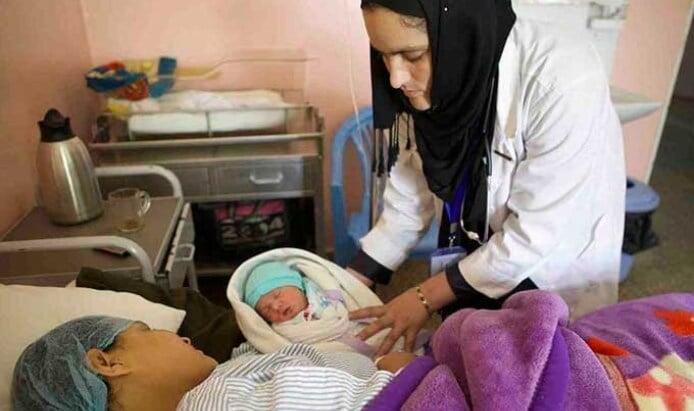KABUL, Afghanistan – Boosting the ranks of midwives has helped to lower Afghanistan’s towering maternal and newborn death rates, a new report shows.
Decades of grinding conflict and repressive attitudes towards women had led to enormous maternal and infant death rates, according to the report, the State of Afghanistan’s Midwifery 2014. After Taliban insurgents gained control in 1996, restrictions on women’s health care – in particular, a prohibition on receiving care from male health workers – left many pregnant women without the assistance of skilled health personnel such as doctors, nurses or midwives.
By 2002, Afghanistan’s maternal mortality ratio was one of the highest in the world. For every 100,000 live births, some 1,600 women died from causes related to pregnancy or childbirth, says the report, which was jointly produced by UNFPA, Afghanistan’s health ministry, and other partners.
Empowering midwives
To reverse this trend, health officials and international partners sought to strengthen midwifery services – both in hospital settings and in rural communities, where many women live beyond the reach of conventional health facilities. To develop the skills of midwives, UNFPA and partner organizations supported a variety of two-year training programmes.
“In the past, the community thought very negatively of the midwifery profession. Many patients and their families didn't trust us and wanted doctors even for routine procedures,” said Fahima Naziri, the midwifery head at the CURE maternity hospital in Kabul.
“Now, the situation has changed. With the professionalization of midwifery, people trust midwives and respect us as health professionals,” she said.
These programmes helped increase the proportion of people living within a two-hour walk of basic health care – between 2003 and 2009, this number grew from 9 per cent to 85 per cent.
Today, "Afghanistan is a regional leader in the midwifery profession and a model for reducing maternal mortality in post-conflict settings," said Deputy Public Health Minister Ahmad Jan Naeem at the report’s launch on 12 December. "In 2002, there were only 467 midwives in the country. A decade later, more than 4,600 midwives work in Afghanistan."
According to UNFPA’s latest State of World Population report, Afghanistan’s maternal death rate now stands at 400 deaths per 100,000 live births – still among the highest in the world. Other estimates, from the Afghanistan Public Health Institute, are a little lower.
Maternal mortality in Afghanistan is “still unacceptably high,” Public Health Minister Suraya Dalil conceded in the report, “but [it is] showing significant progress”.
Still, much more progress is needed. In 2012, only 23 per cent of the need for maternal and reproductive health services was met, the State of Afghanistan’s Midwifery indicated.
And “if Afghanistan maintains its current graduation rate, only 8 per cent of estimated need will be met in 2030,” it said.
Bachelor’s degree programmes
In response, health officials are redoubling their efforts. Afghanistan is now among the first countries in the region to develop an internationally recognized degree-level midwifery programme.
“I have witnessed the difficulties women face in safely delivering babies,” said Yalda, a young woman from Faryab Province . “When my cousin was pregnant, we called the ambulance, but it didn't arrive on time. She started bleeding and her child died.”
Yalda is now enrolled in the four-year midwifery programme at Kabul University, where UNFPA helped to develop the curriculum. “This is the first time I have left my home and family,” she said, adding, “I will be the first in my province” to earn a bachelor’s degree in midwifery.
After she completes her studies, Yalda wants to return home to help the women in her community. But she knows that persistent, traditional ideas about women and childbirth will pose a challenge to her and other midwives.
“Lack of knowledge and tradition are the key barriers for women accessing reproductive health services. For instance, mothers-in-law will say that they delivered their babies at home and that they didn't need to go to hospital. They will ask their daughters-in-law why they want to go to a hospital.”
But she and her classmates say they are undeterred by the many obstacles they face.
“I chose to help Afghan women because they really need us,” said Nasrin, another midwifery student at Kabul University. “Afghanistan needs many changes in many areas. When it comes to health care, I will do whatever I can for women and children.”


